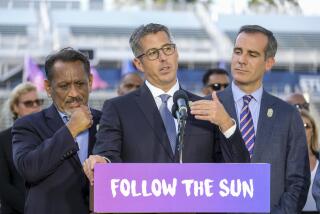Bitter Shandling-Grey Break-Up Strikes a Nerve in Hollywood
- Share via
When it comes to sheer irony, how can you top Garry Shandling--who skewers Hollywood narcissism on “The Larry Sanders Show” playing a neurotic late-night TV host--becoming embroiled in a scenario as outlandish as any presented on that series?
The theatrics surrounding the $100-million lawsuit the star leveled against his manager-producer, Brad Grey, last week would make great fodder for the weekly comedy series. In real life, however, the action shattered an 18-year relationship that included growing up together in the business as well as a close friendship.
Those close to Grey characterize the split as a highly charged, Hollywood-style divorce. Though many break-ups may be equally bitter, few have the potential of being as costly. This particular split also underscores the unique dynamic that can result when talent representatives become more powerful than the artists they represent.
Shandling claims he’s entitled to a substantial share in the success of Brillstein-Grey Enterprises, the entertainment venture that Grey and partner Bernie Brillstein have built over the years.
The star of “Larry Sanders,” a critically lauded satire on Home Box Office, is accusing Grey--his manager and partner in producing the show, as well as “It’s Garry Shandling’s Show” for Showtime--of putting his interests as a producer ahead of Shandling’s as a client.
The suit is an example of how business dealings can sour even the closest friendships, and it has also spurred debate about several delicate issues, including the age-old conflict-of-interest questions raised when managers also produce.
The claim has also touched a personal nerve among Grey and Shandling’s mutual representatives, forcing at least one--their longtime publicist--to take the unusual step of publicly choosing sides.
Brillstein summed it up this way: “It’s tragic that a success story can turn into this.”
Grey began managing Shandling some 18 years ago--while still a college undergrad--after the two were introduced by one of Grey’s three clients at the time, Bob Saget. Their business association evolved into a personal relationship, with Shandling becoming a close family friend and sometimes sharing vacations in Hawaii.
About 3 1/2 months ago, Grey dropped Shandling as a client for reasons that remain in dispute. According to sources close to Grey, he reluctantly took the action because of Shandling’s increasingly hostile, abusive and erratic behavior toward Grey, others at his company, and various writers and producers on “The Larry Sanders Show.”
For at least a year, Grey is said to have tried to put things back on track with Shandling. One source said the more Brillstein-Grey’s business grew over the years, “the more awkward things got between them, because there was a lot of envy and jealousy on Garry’s part.”
“Garry saw Jerry Seinfeld getting more successful,” says a source, “and thought: ‘I’m this poor nebbishy guy with no network show. Boy, did these people [take advantage of] me.’ ”
Shandling’s attorneys call such assertions “nonsense,” saying Grey quit after Shandling retained Hollywood lawyer Barry Hirsch, who began questioning the financial deals between Shandling and Brillstein-Grey.
They cite as proof the fact that Grey returned $1.2 million in commissions taken from Shandling and offered the comic a lucrative consulting deal. Grey quit, they said, after Shandling’s representatives continued to press the issue.
“Garry Shandling wasn’t erratic. Garry Shandling finally had an independent person advising him of his financial rights,” said Jonathan Schiller, Shandling’s other attorney in the case.
Grey’s attorney, Bert Fields, acknowledged that several months before resigning, Grey returned some commissions in an attempt to put their relationship back on track, sending Shandling a check from a “goodwill payment” made by HBO to ensure the comic’s exclusivity to the cable network.
“Brad said to Garry, ‘We’ve been together a long time, and if you think any commission I took was unfair, I’ll give it back to you,’ and he did,” said Fields, who maintained that Shandling’s complaint is “littered with demonstrably false allegations,” including that Brillstein-Grey was built on Shandling’s ideas. “That’s just nuts,” he said.
Grey has built a formidable enterprise. In 1994, he secured $100 million in a production partnership with ABC, then two years later sold a half-interest in Brillstein-Grey’s TV business to hit-starved Universal Studios for a reported $90 million.
Shandling believes he’s entitled to share in the more than $200 million worth of deals negotiated by Brillstein-Grey, whose creative reputation was based in part on the critical success of “Larry Sanders.” The comic’s representatives paint their client as a naive artist who assumed Grey was looking out for his interests and until recently put little effort into protecting them himself.
“This is not Brad rejecting Garry,” said one source close to Shandling.
Sources in Grey’s camp say that because Shandling’s main interest was maintaining total creative control over his shows, he was willing to forgo certain financial awards in deals he made with HBO and Showtime.
Nonetheless, Shandling, who has half-ownership in his shows, has what has been described as a state-of-the art deal with HBO, making nearly $500,000 per episode as writer, producer and star of his show. A source close to Grey estimates that Brillstein-Grey has helped Shandling make about $30 million to $40 million over the years.
Still, Shandling’s claim that Grey took advantage of his position as a manager to further his career as a producer has resonated in Hollywood.
The conflict-of-interest issue has been simmering for years, especially as more management companies produce shows and movies for those they represent.
Unlike franchised talent agents, personal managers are allowed to produce and, in some cases, have used their leverage to extract producer titles and fees without actually providing such services.
In the last four years, Brillstein-Grey--which represents such talent as Brad Pitt, Nicolas Cage and Dennis Miller--has become a major producer of TV programming, including NBC’s “Just Shoot Me” and “The Naked Truth” and ABC’s late-night show “Politically Incorrect With Bill Maher.”
Managers contend that if they didn’t represent their clients’ interests, they’d be out of business.
“I’m in the representation business, and the key to my business is doing a good job for the people I represent. . . . To do otherwise would be remarkably shortsighted,” said Erwin More, a partner in the management firm More-Medavoy, which produces shows for several clients, including the hit ABC comedy series “Dharma & Greg.”
Many talent agents and studio executives believe that managers should focus on managing clients, not on producing their work.
“Of course it’s extortion,” said Pat McQueeney, an independent agent who has represented actor Harrison Ford for 27 years. Formerly a manager, McQueeney has always refused to put her name on any of her sole client’s movies.
“I don’t approve of it,” she said. “It’s double-dipping to be paid a double commission as a manager and a producer.”
According to McQueeney, “People have said, ‘Produce with us,’ trying to bribe me by giving me a job I don’t want” to secure Ford’s commitment to a project. Because “everybody’s dream in this town is to become a producer, I feel they [managers] use their clients to benefit themselves and further their own careers.”
Those close to Grey say that whatever the broader implications, this case isn’t illustrative of them.
The lawsuit has proved uncomfortable for those who do business with both Grey and Shandling.
Publicist Dan Klores, who represented both Grey and Shandling as well as the show, dropped Shandling as a client, making public a letter he sent to the comic that called his actions toward Grey “illogical and irrational.”
Meanwhile, Shandling’s representatives at United Talent Agency have also found themselves caught in the middle. Not only does UTA share a number of clients with Brillstein-Grey, but Shandling’s main agent, Jim Berkus, is a close friend of Grey’s.
Although Shandling was signed as a new client only a few months ago, Berkus denied rumors that the agency plans to sever the relationship.
“We’re absolutely not dropping Garry Shandling as a client and are absolutely under no pressure from anyone to do so,” Berkus said.
Asked Monday about the lawsuit at a media event hosted by HBO, Shandling told reporters, “The facts of that case, which are a business issue, will come out in court if they have to.” He declined to comment further other than to say the suit played no part in his decision to end “Larry Sanders” after this season.
Shandling also said he hasn’t decided exactly how to finish the series. Given the high drama going on behind the scenes of his show within a show, the perfect finale may be playing out right under his nose.


